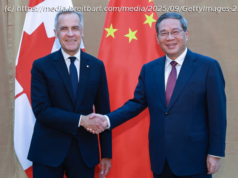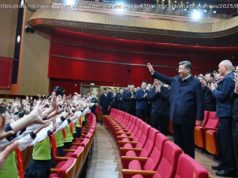Beijing’s economic nationalism is harming a vital relationship.
President Donald Trump and the Democrats can’t agree on anything, except one big thing: China. After the administration announced plans on June 15 to impose tariffs on $50 billion of Chinese imports, Charles Schumer, the Democrats’ Senate leader, called the decision “on the money.”
That was a startling statement on a startling fact: China has few friends left in Washington, on either side of the political aisle. The bipartisan vote to block Trump’s compromise on ZTE Corp. sanctions is further evidence.
This is a remarkable turnaround. Only two to three years ago, engagement with China was a core principle of American foreign policy, accepted by both political parties. Now, that approach is being questioned. Were America’s leaders naive to think the communist nation could be a reliable partner for the democratic West? Should the U. S. have cooperated in China’s quest for wealth in the first place? Where did Washington “go wrong” with Beijing?
Those questions can be flipped on their heads. Beijing has managed, in an astonishingly short span, to transform the world’s most powerful nation from eager comrade to possible cold warrior. Washington made its share of missteps. What we really need to ask, though, is not how the U. S. went wrong with China, but how China went wrong with the U. S.
Consider how much China has benefited from its cooperative relationship. Since the 1970s, a primary aim in Washington was to integrate the country into the U. S.-led global economic order through trade and investment. That open door made possible China’s economic miracle by supplying the access to markets, capital, jobs and technology the impoverished nation needed.
The U. S. maintained this strategy even when Beijing abused it. For example, Washington lawmakers have often criticized China’s practice of manipulating the yuan to promote exports. After rancorous debate, the nation got a pass. Short-term sacrifices were worth the long-term payoff.
Or so Washington thought. The problem is that the payoff never came, at least not as the U. S. expected. Rather than a trustworthy partner, China appeared more and more the ungrateful moocher, a danger to the world order rather than an important participant. Accommodation looked increasingly like appeasement.
Beijing’s leaders could easily have kept the U. S. happy. Washington tried for years to negotiate to improve market access and address other economic concerns, often at very high levels. China pledged and promised, and did little. Instead, Beijing persisted in predatory practices – forcing American companies to disgorge technology, subsidizing domestic industry, harassing or blocking foreign firms.
That undercut its leaders’ credibility. They insist they want to defuse an escalating trade war through dialogue. But the fruitless experience of the past has convinced Trump and his advisers that the Chinese use negotiations as a delaying tactic. They’re not wrong.
Further, Beijing has subverted the institutions and norms intended to resolve such disagreements. While it’s a member of the World Trade Organization, China flouts WTO requirements. Its aggressive militarization of the South China Sea to enforce controversial claims to most of that body of water is a clear challenge to international practice. While insisting on a bigger voice in organizations like the International Monetary Fund, China has created a rival, the Asian Infrastructure Investment Bank, that it can more readily control.
All this fosters the belief that China won’t abide by the rules of the global system. We end up with Trump, unilateral action, and confrontation.
Where did China “go wrong”? The answer is in growing economic nationalism, a product of its leaders’ confidence in the superiority of their system. Perhaps they miscalculated, assuming they could continue to exploit the openness of the global economy to forward their interests while a divided and profit-obsessed West would continue to acquiesce.
Now China is watching doors close to technology and markets that it badly needs open.
Beijing could probably reverse the damage by taking more seriously the concerns of its trading partners. There’s little sign of that. In recent months, China has announced a handful of market-opening reforms, but they will have limited impact and are often self-serving. In its negotiations over Trump’s tariffs, the government offered to buy a few more soybeans, but not much more – dodging the critical issues of technology protection, market access and subsidy-laden and market-distorting industrial policies.
China’s leaders may believe that their economic agenda is best served at the expense of good relations with the U. S. They may come to realize they blew an opportunity to accomplish both ends.
To contact the author of this story: Michael Schuman at contactschuman@gmail.com
To contact the editor responsible for this story: Paul Sillitoe at psillitoe@bloomberg.net






